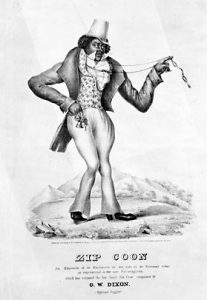
“Zip Coon.” In The American Mosaic: The African American Experience, ABC-CLIO, 2018. Image. Accessed March 7, 2018. https://africanamerican2.abc-clio.com/Search/Display/1612306.
Most children grow up learning songs by Stephen Collins Foster, and the melodies are quite catchy. However, if one thinks of the background of such tunes, and how they are mostly minstrel songs, they can seem problematic. Minstrel shows incorporated blackface: when white people would use burnt cork to give themselves the appearance of an African American with exaggerated features.1 While in this getup, they would portray racial stereotypes that are very offensive. This sheet music cover depicts one of the stock characters white men would portray in their minstrel performances.
The songs of minstrel shows inspired Stephen Foster into writing more of these popular tunes.2 He is famous for many memorable melodies, including “Oh, Susanna!” and “Old Folks at Home”. These songs remained popular well passed the 1920s, and we all know them today. If one watches a scene from Riding High (Frank Capra, 1950), one can hear the legendary Bing Crosby singing one of Foster’s hits, “Camptown Races”.
It sure is catchy! However, if one listens closely and reads the original lyrics, one can see where this song becomes problematic. First of all, the actual title is “De Camptown Races”, and the words are written in a way that portrays the dialect of a stereotypically, ill-educated, African American; for example: the use of “de” and “gwine”. This little ditty was originally written with the intention of white performers painting their faces black and singing the song in order to mock African Americans.3 Despite the racist nature of this tune, it lives on as an American folk classic, as many of Foster’s songs have.
I’m not saying it’s horrible to enjoy this song or others like it. Many people do. No matter if people still find the melody catchy today, it is important to remember the history, whether or not they associate the song with the disturbing truth of the past.
1 “Minstrel Songs – The Library of Congress Celebrates the Songs of America.” The Library of Congress. www.loc.gov/collections/songs-of-america/articles-and-essays/musical-styles/popular-songs-of-the-day/minstrel-songs/.
2 “Stephen Collins Foster, 1826-1864.” The Library of Congress. www.loc.gov/item/ihas.200035701/.
3 Ruehl, Kim. “The ‘Doo Dah’ Song: ‘Camptown Races’ by Stephen Foster.” ThoughtCo. October 25, 2017. www.thoughtco.com/camptown-races-stephen-foster-1322494.
